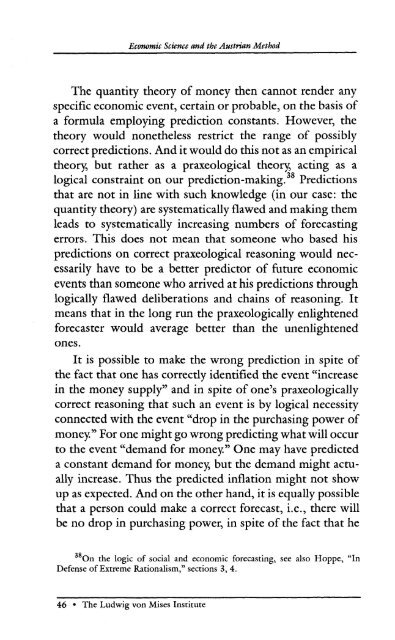Economic Science and the Austrian Method_3
Economic Science and the Austrian Method_3
Economic Science and the Austrian Method_3
- No tags were found...
Create successful ePaper yourself
Turn your PDF publications into a flip-book with our unique Google optimized e-Paper software.
<strong>Economic</strong> <strong>Science</strong> <strong>and</strong> <strong>the</strong> <strong>Austrian</strong> <strong>Method</strong>The quantity <strong>the</strong>ory of money <strong>the</strong>n cannot render anyspecific economic event, certain or probable, on <strong>the</strong> basis ofa formula employing prediction constants. However, <strong>the</strong><strong>the</strong>ory would none<strong>the</strong>less restrict <strong>the</strong> range of possiblycorrect predictions. And itwould do this not as an empirical<strong>the</strong>or~ but ra<strong>the</strong>r as a praxeological <strong>the</strong>or~ acting as alogical constraint on our prediction-making. 38 Predictionsthat are not in line with such knowledge (in our case: <strong>the</strong>quantity <strong>the</strong>ory) are systematically flawed <strong>and</strong> making <strong>the</strong>mleads to systematically increasing numbers of forecastingerrors,. This does not mean that someone who based hispredictions on correct praxeological reasoning would necessarilyhave to be a better predictor of future economicevents than someone who arrived at his predictions throughlogically flawed deliberations <strong>and</strong> chains of reasoning. Itmeans that in <strong>the</strong> long run <strong>the</strong> praxeologically enlightenedforecaster would average better than <strong>the</strong> unenlightenedones.It is possible to make <strong>the</strong> wrong prediction in spite of<strong>the</strong> fact that one has correctly identified <strong>the</strong> event "increasein <strong>the</strong> money supply" <strong>and</strong> in spite of one's praxeologicallycorrect reasoning that such an event is by logical necessityconnected with <strong>the</strong> event "drop in <strong>the</strong> purchasing power ofmone)!." For one might go wrong predicting what will occurto <strong>the</strong> event "dem<strong>and</strong> for mone)!." One may have predicteda constant dem<strong>and</strong> for mone~ but <strong>the</strong> dem<strong>and</strong> might actuallyincrease. Thus <strong>the</strong> predicted inflation might not showup as expected. And on <strong>the</strong> o<strong>the</strong>r h<strong>and</strong>, it is equally possiblethat a person could make a correct forecast, Le., <strong>the</strong>re willbe no drop in purchasing power, in spite of<strong>the</strong> fact that he380n <strong>the</strong> logic of social <strong>and</strong> economic forecasting, see also Hoppe, "InDefense ofExtreme Rationalism," sections 3, 4.46 • The Ludwig von Mises Institute


